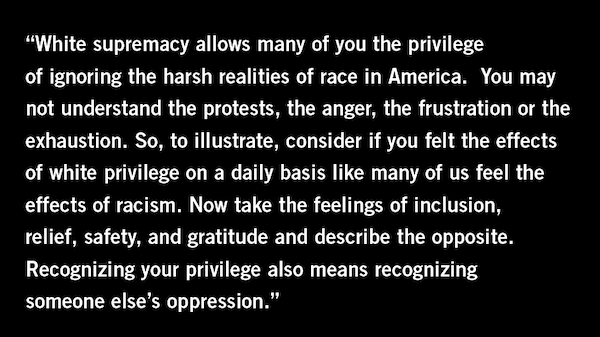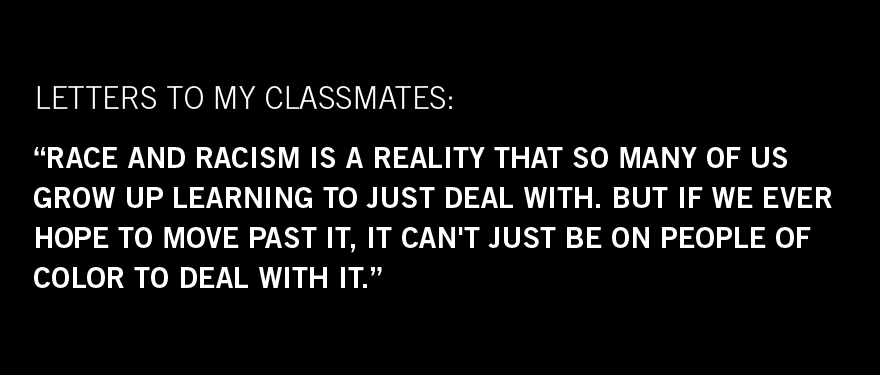Black students in our community have spent the last few weeks grappling with the weight of a devastating truth: that our country and society has undeniably and systemically failed Black communities – and the false narrative that being well educated, professionally accomplished and palatable enough for predominantly white spaces is still not be enough to keep Black people safe – and there isn’t a job title or degree in the world that can protect Black communities from institutionalized and systemic racism.
Members of the HBS African American Student Union have written a series of Letters to our Classmates in an effort to elevate this message: “On behalf of your Black classmates: we’re not okay, and you shouldn’t be either”. The letters are meant to remove the onus too often placed on Black students to discuss and teach fellow classmates about the lived experiences of being Black in America. The MBA Voices blog will publish these letters, daily, with a link to the ongoing series as it unfolds.
This blog is 3/5.

Ade Popoola, MBA 2021
To my Classmates,
By now you may have seen a social media post or twenty telling you, “DO NOT reach out to your Black friends asking them how to fix racism.” Or maybe this one: “Before reaching out to Black people, go through these 10 steps.” I find the full text scripts of what to say to your Black friends particularly funny. Jokes aside, these posts are highlighting the fact that the burden to fix systemic racism falls on your Black friends and coworkers by default.
I would like to be one of many to tell you that Black people are not responsible for your education on individual, institutional, or structural racism. Furthermore, the time to be a silent and passive ally is over. It is time to act.
PSA: Black people aren’t born knowing how to dismantle systemic racism.
If we choose to, and are able to, we have to go through personal education just like everybody else. Here are a couple ways we learn:
1. We experience direct/indirect racism and figure out how to move and operate in racist society.
2. We intentionally seek and study African and African American History because many school districts fail to teach students accurate and complete versions.
3. We support, join, and learn from organizations that are advancing racial justice.
4. We organize, connect, and collaborate with people who are invested in Black liberation.
5. We train to become racial equity and justice professionals.
We continuously go through these edifying examples to unlearn and learn, sharpening our racial justice tools along the way. Example 1 is often an impetus for us to start learning more. Be grateful if you can skip that part, but acknowledge that you are fully capable of 2-5 if you choose.
Now I’m not saying all Black people aren’t willing to share their knowledge and help you catch up. I’m asking that you simply “read the room.” Put a bit more thought into your question before you burden your Black friend or coworker about something that can be mentally, physically, and emotionally exhausting.
White supremacy allows many of you the privilege of ignoring the harsh realities of race in America. You may not understand the protests, the anger, the frustration or the exhaustion. So, to illustrate, consider if you felt the effects of white privilege on a daily basis like many of us feel the effects of racism. Now take the feelings of inclusion, relief, safety, and gratitude and describe the opposite. Recognizing your privilege also means recognizing someone else’s oppression.
Why you need to step up
Here are a couple reasons why you should join the fight for racial justice:
You aren’t devoid of race.
Addressing racial identity can sometimes feel like a choice for you and unfair obligation for us. In particular, some white classmates can come across as if they are devoid of race because white supremacy allows them to view whiteness as the norm. Furthermore, the separation white classmates feel from their race seems to allow them to dodge the role of solution-finding in race conversations. To set the record straight, white people created the social construct of race, created false racial hierarchies that justified slavery, and created institutional and structural racism. I know YOU specifically didn’t do this, but I think this point illustrates that you, too, should have skin in the game in terms of dismantling systems of oppression. If your race gives you privilege, acknowledge it and find ways for it to benefit others.
Your Black classmates need support...
In the workplace: In this moment of racial reckoning, some of your Black classmates entering new internships and full-time roles are expected to participate in/lead a racial equity taskforce all while subduing their emotional struggles under professionalism. Some may not want this responsibility, but may feel uncomfortable saying “no” because they're new or because they are the only person of color in the organization. These assignments take time and effort, which can delay your classmates’ professional achievements and exasperate inequalities present in the workplace. Also, let’s not forget that minorities can be penalized for promoting diversity. The burden should not solely fall on Black people to solve a problem that they didn’t create. You, too, can hold your organization accountable to make sure everyone is a part of the solution.
In the classroom: We can sometimes feel a burden to speak up about issues of race in the classroom. If we don’t interject, often nothing will be said. We go through mental math: what is the benefit of speaking up relative to how much social capital will be lost? We must be prepared for classmates to think, “Why does she always have to play the race card?” or, “This isn’t about race.” Once these narratives come into play, we understand that some of our classmates may tune us out; if they don’t think race is important, they will think our comments are invalid. Our professors are not exempt from these dismissals. If they are unable to handle a conversation about race, they may intentionally redirect the class.
You may go through a similar cost benefit analysis on whether to be a vocal ally on issues of race. However, when you speak up, you will likely not face the same consequences your Black classmates face in the workplace or in the classroom. Yes, these conversations can be tough, but you have to get comfortable talking about race and racism. Unfortunately, your racial privilege means people are more willing to listen to you over me. Don’t leave your Black classmates further marginalized because you don’t have the words to say. We need you to step up way more and do the hard work, too.
What you should do
As students, what better time than now to unlearn (implicit bias) and learn (anti-racism).
If you haven’t gathered by now, your goal needs to be continuously educating yourself and shifting towards anti-racism. However, you don’t need to reinvent the wheel. There are many Black leaders and organizations that have been doing this work for a long time that you can learn from, donate to, and join. If you’re at a complete loss on where to start, check out, What MBAs can do in defense of Black lives by Holly Fetter (MBA ’20).
The one piece of advice that I will give if you’re just beginning your racial justice journey is to stay humble. You’re not going to get everything right all at once, but that doesn’t mean you shouldn’t try or that you can’t rethink your previously held ideals. You will make unintended mistakes, but take responsibility for the impact. Fighting for racial equity and justice is a lifetime journey, so start developing your long-term commitment towards change now.
New Normal
We need more allies; we need more accomplices; and we need more co-conspirators. We need you to actively work towards being anti-racist. We need you to stand up and speak up with us. What’s happening all over the world right now is a movement not a moment, so don’t get left behind.
I was first hesitant about what a “new normal” would look like after this pandemic, but now I stand hopeful and cautiously optimistic.

